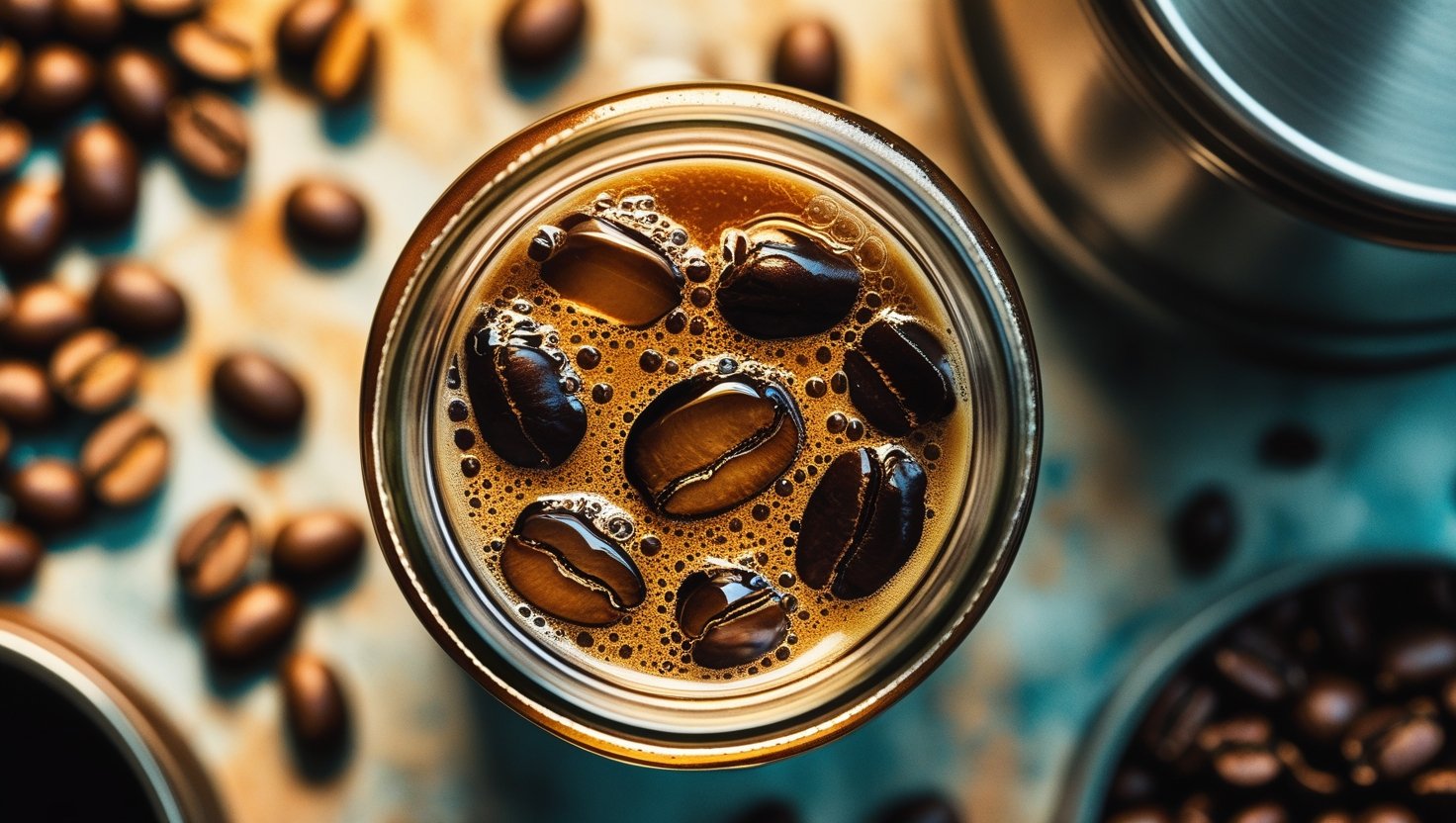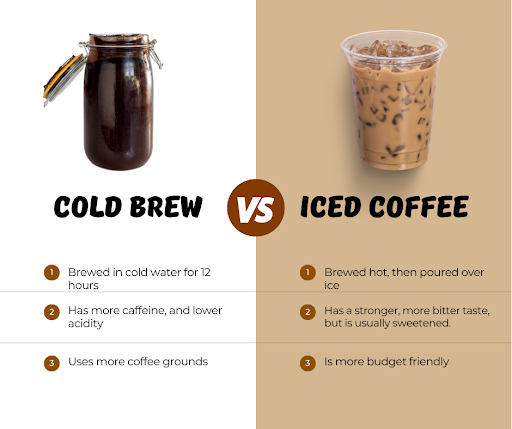☀️ The Summer Buzz That Hits Differently

It was a record-hot July in Portland when Maya, a habitual latte lover, switched to cold brew. She liked its smooth flavor and ice-cold feel, but something strange started happening.
By mid-afternoon, she wasn’t just energized—she was jittery. Her heart raced after just one glass. It felt stronger than her usual morning espresso.
Confused, Maya asked herself: Is cold brew stronger than regular coffee? Or was it just a placebo, tricked by temperature and taste?
Let’s dive into the science, flavor, and myth of one of the most debated coffee questions: Is cold brew actually stronger?
What Is Cold Brew Coffee?
Cold brew isn’t just cold coffee.
It’s made by steeping coarsely ground coffee in cold water for 12 to 24 hours, then straining the grounds to leave behind a chilled concentrate.
🧊 Key Characteristics:
Time-based extraction (not heat-based)
Lower acidity
Mellow, chocolatey flavor
Served chilled, often diluted with water, milk, or cream
This brewing process makes cold brew chemically different from hot coffee—and may affect both strength and perception.
What Does “Stronger” Really Mean?
Before comparing, let’s define “stronger.” The word can refer to:
Caffeine content – How much stimulant it contains
Flavor intensity – How bold, bitter, or full-bodied the taste is
Concentration – How potent the coffee-to-water ratio is
The confusion often arises because cold brew can taste smoother while being more caffeinated. So, we need to break each meaning down to get a full picture.
1. Caffeine Content: Is Cold Brew Higher?
Short answer: Yes—cold brew can have more caffeine, but it depends on how it’s served.
📊 Average Caffeine Comparison (per 12 oz drink):
| Drink | Caffeine (mg) |
|---|---|
| Cold Brew | 150–250 |
| Iced Coffee | 95–165 |
| Drip Coffee | 140–200 |
| Espresso (1 oz) | 63 |
🧠 Source: Mayo Clinic, USDA FoodData Central
Why So High?
Cold brew is often made with a higher coffee-to-water ratio, usually 1:4 or 1:5, versus 1:15 for drip. That means more caffeine per ounce, especially in undiluted concentrate form.
Some commercial cold brews—like Starbucks’ Nitro Cold Brew—contain up to 280 mg of caffeine in a grande (16 oz).
That’s more than two cans of Monster Energy.
So yes, cold brew can be much stronger in terms of caffeine, especially when consumed as a concentrate.
2. Flavor Strength: Does Cold Brew Taste Stronger?
Surprisingly, cold brew tastes less strong than hot coffee, even if it contains more caffeine.
Why?
Cold water extracts fewer bitter compounds and acids
It emphasizes smooth, low-acid, chocolatey or nutty flavors
Lower temperature = slower extraction of volatile oils
This leads to the illusion that it’s weaker than hot coffee. But don’t let the mellow flavor fool you—there’s power underneath the surface.
3. Is Cold Brew Concentrated?
Absolutely. In fact, most homemade and commercial cold brews are technically coffee concentrates.
They’re usually diluted before serving:
1:1 with water or milk (typical café ratio)
Or poured over ice (which dilutes as it melts)
But if you drink it straight, you’re consuming something 2–3x more potent than regular drip coffee.
⚠️ Drinking undiluted cold brew concentrate is one of the fastest ways to hit the caffeine limit—and experience side effects.
What About Espresso?
Espresso often gets the title of “strongest coffee” due to its bold flavor and tiny size, but it’s less caffeinated per ounce than cold brew.
Example:
1 oz espresso: 63 mg caffeine
3 oz cold brew concentrate: ~150 mg caffeine
If you drink 12 ounces of cold brew, you may be getting 3–4 times the caffeine of a single espresso shot.
Cold Brew vs Iced Coffee: Key Differences
Many people confuse cold brew with iced coffee. Here’s how they differ:
| Feature | Cold Brew | Iced Coffee |
|---|---|---|
| Brew Method | Steeped in cold water | Hot-brewed, then chilled |
| Brew Time | 12–24 hours | 4–10 minutes |
| Acidity | Low | Higher |
| Flavor | Smooth, mellow | Bright, bold |
| Caffeine (12 oz) | 150–250 mg | 95–165 mg |
So yes—cold brew is usually stronger than iced coffee in terms of caffeine and concentration, even if it tastes smoother.
Health Impacts of Cold Brew Strength
With higher caffeine content, cold brew may:
✅ Improve focus and alertness
✅ Boost metabolism
✅ Enhance exercise performance
⚠️ Trigger anxiety or heart palpitations in sensitive individuals
⚠️ Disrupt sleep if consumed too late
☑️ General Caffeine Guidelines:
Safe daily limit (FDA): 400 mg
That’s about two 12 oz cold brews, depending on strength
If you’re drinking cold brew all day without measuring, you could easily exceed the safe limit.
Who Should Be Cautious?
Cold brew may not be ideal for:
Those with heart issues or anxiety
Pregnant individuals (ACOG recommends <200 mg/day)
People with low caffeine tolerance
Teens and children (should limit or avoid caffeine)
Why Cold Brew Might Feel Stronger
It’s not just chemistry—it’s psychology.
Here’s why some people feel cold brew is “too strong”:
It’s easy to drink fast (cold, smooth, no bitterness)
You don’t feel it right away—but 30–60 minutes later, the caffeine rush hits hard
People often underestimate the amount of concentrate in their cup
How to Control the Strength of Cold Brew
🧪 DIY Tips:
Use a 1:8 ratio for a gentler brew
Dilute concentrate 1:1 or 1:2 with water/milk
Use Arabica beans (lower caffeine than Robusta)
Steep for 12 hours (shorter = less caffeine)
If you’re buying cold brew from a café, ask:
“Is this a concentrate, or ready to drink?”
And if it’s concentrate, ask how it’s diluted. Your jitters might be hiding in that answer.
Where Coffea Alchemy Comes In
At Coffea Alchemy, we guide curious drinkers through the nuances of brew strength, bean selection, and caffeine clarity. Whether you’re cold steeping at home or sipping on the go, we help you decode what’s in your cup—and how it affects your mind and body.
Because coffee should be empowering, not overwhelming.
Conclusion: Stronger, Yes—But in More Ways Than One
So, is cold brew stronger than other coffee types?
Yes, in caffeine and concentration—especially if undiluted.
No, in flavor boldness—it’s actually smoother and more subtle.
Strength isn’t just what hits your tongue—it’s what hits your bloodstream. Cold brew might go down easy, but it can pack a stronger punch than you realize.
So next time you order that tall glass, ask yourself:
Are you ready for the smoothest caffeine jolt of your day?
Related Post
Our newsletter
Subscribe to our weekly newsletter & keep up with our latest recipes and organized workshops. You can unsubscribe at any time.
SUBSCRIBE (100% FREE)

